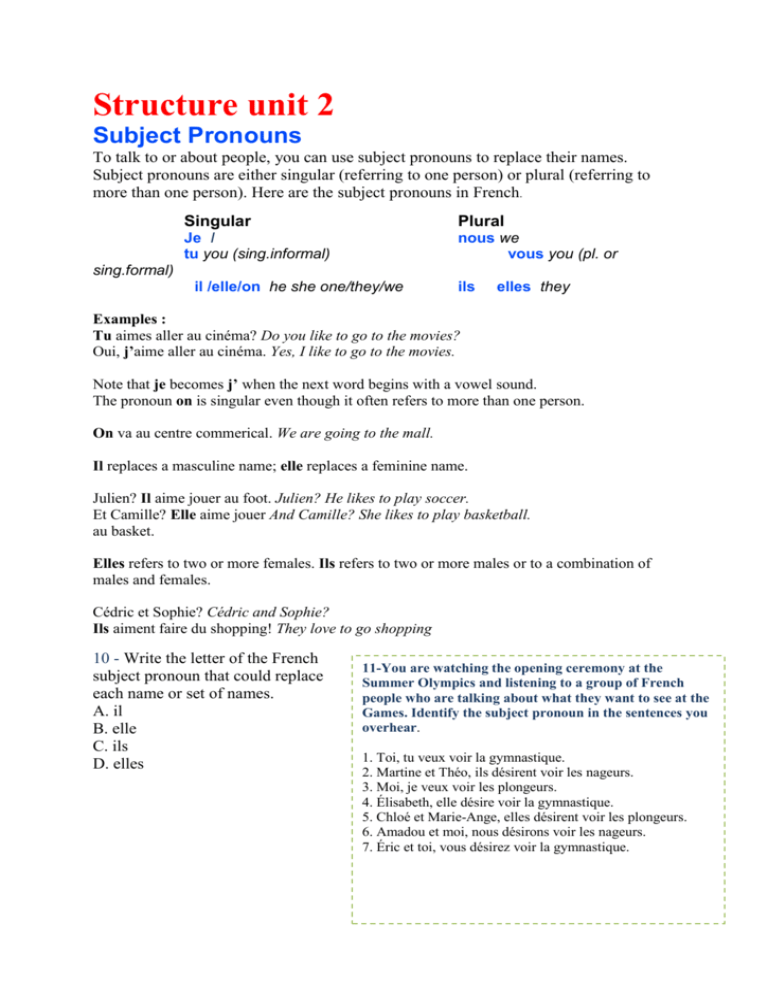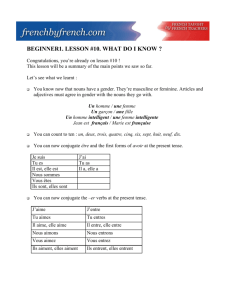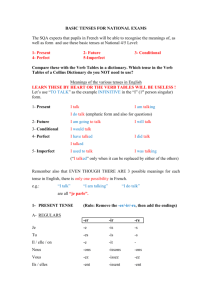Structure unit 2 de la langue Subject Pronouns
advertisement

Structure unit 2 de la langue Subject Pronouns To talk to or about people, you can use subject pronouns to replace their names. Subject pronouns are either singular (referring to one person) or plural (referring to more than one person). Here are the subject pronouns in French. Singular Plural Je I tu you (sing.informal) nous we vous you (pl. or sing.formal) il /elle/on he she one/they/we ils elles they Examples : Tu aimes aller au cinéma? Do you like to go to the movies? Oui, j’aime aller au cinéma. Yes, I like to go to the movies. Note that je becomes j’ when the next word begins with a vowel sound. The pronoun on is singular even though it often refers to more than one person. On va au centre commerical. We are going to the mall. Il replaces a masculine name; elle replaces a feminine name. Julien? Il aime jouer au foot. Julien? He likes to play soccer. Et Camille? Elle aime jouer And Camille? She likes to play basketball. au basket. Elles refers to two or more females. Ils refers to two or more males or to a combination of males and females. Cédric et Sophie? Cédric and Sophie? Ils aiment faire du shopping! They love to go shopping 10 - Write the letter of the French subject pronoun that could replace each name or set of names. A. il B. elle C. ils D. elles 1 11-You are watching the opening ceremony at the Summer Olympics and listening to a group of French people who are talking about what they want to see at the Games. Identify the subject pronoun in the sentences you overhear. 1. Toi, tu veux voir la gymnastique. 2. Martine et Théo, ils désirent voir les nageurs. 3. Moi, je veux voir les plongeurs. 4. Élisabeth, elle désire voir la gymnastique. 5. Chloé et Marie-Ange, elles désirent voir les plongeurs. 6. Amadou et moi, nous désirons voir les nageurs. 7. Éric et toi, vous désirez voir la gymnastique. tu vs. vous 1 The subject pronouns tu and vous both mean “you,” but are used in different ways. When you talk to one person,use tu (the familiar form) with: • a friend • a person your own age • a close relative • a child • a pet When talking to more than one person, always use vous. Anne, Lucie, Amir , comment allez-vous? Anne, Lucie, Amir, how are you? use vous (the formal form) with: • an acquaintance • a person older than you • a distant relative • an adult you don’t know • a person of authority, such as a teacher or doctor 0 comparaison Activite 13 TU OU VOUS ? How is the plural form of “you” expressed in English? Kirsten and Lance, are you ready for the quiz? You guys get 15 minutes to study. You allInfinitives must take the test now. A verb expresses action or a state of being. The basic Say if you would follow each exchange below with a sentence that uses tu or vous. 1. Salut, ça va? 2. Bonjour, les amis! 3. Au revoir, Madame! 4. À demain, Monsieur Duval! 5. Ah, Snoopy! 6. Anne et Michèle, on va à la maison? 7. Salim, on va à la fête? form of a verb is called the in_ nitive. This form is found in the end vocabulary of this textbook Infinitives A verb expresses action or a state of being. The basic form of a verb is called the in_ nitive. This form is found in the end vocabulary of this textbook and in French dictionaries. Many French infinitives end in –er, such as présenter, aider, nager, aimer, manger, jouer, and plonger. Activite 15 Say that you do two outdoor activities when it is nice out, and two indoor activities when the weather’s bad. 1. Quand il fait beau, j’aime ___________________________________ 2. Quand il fait mauvais, j’aime_________________________________. 3. Quand il fait beau, j’aime____________________________________. 4. Quand il fait mauvais, j’aime ________________________________. Present Tense of Regular Verbs Ending in –er Regular verbs follow a predictable pattern. Regular –er verbs, such as jouer, have six forms in the present tense. To form the present tense of a regular –er verb, drop the – er ending from its infinitive to find the stem. Now add the endings (-e, -es, -e, -ons, -ez, -ent) to the stem of the verb depending on the corresponding subject pronouns. Subject Pronouns je tu il/elle/on nous vous ils/elles +Stem +Ending joue joues jou e jouons jouez jou ent Pronunciation Tip Notice the shading in the conjugation of jouer. Despite the _ ve different endings for the subject pronouns je, tu, il/ elle/on, and ils/elles, all forms of the verb in dark yellow are pronounced identically. Only the vous and nous forms are pronounced differently. Vous jouez au foot demain? Are you playing soccer tomorrow? Oui, je joue au foot. Yes, I’m playing soccer. *Remember that je becomes j’ when the next word begins with a vowel sound: J’aime jouer au hockey. Each present tense verb form in French consists of only one word, but has more than one meaning. André nage. André swims. André is swimming. André nage? Does André swim? *If an infinitive ends in –ger, the ending for the nous form is –eons. Nous nageons. We are swimming. Nous mangeons une pizza. We are eating a pizza Comparaisons : How many different ways can you say this sentence in English? What are they? Luc joue au basket. Anne calls to find out who is playing basketball and who is playing soccer at the park on Saturday. Answer her questions saying that the person asked about is playing the other sport. MODÈLE : Vous jouez au foot? Non, nous jouons au basket. 1. Julien joue au basket? 2. Marie-Alix et Delphine jouent au foot? 3. Marcel joue au basket? 4. Tu joues au foot? 5. Khaled et Amadou jouent au basket? 6. Madeleine joue au foot? 7. Vous jouez au foot?



